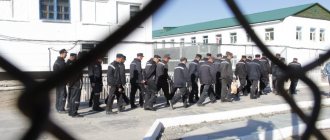The concept of imprisonment. Signs
The content of the concept of “deprivation of liberty” is disclosed in Part 1 of Art. 56 of the Criminal Code of the Russian Federation, which states that deprivation of liberty consists of isolating a convicted person from society by sending him to a penal colony or placement in an educational colony, a medical correctional institution, a correctional colony of general, strict or special regime, or to prison.
Thus, deprivation of liberty consists of isolating the convicted person from society, which is ensured by special institutions that carry out the punishment of imprisonment. The difference between different types of institutions is determined, first of all, by the degree of isolation of the convicted person from society that is ensured in them. In this regard, we can talk about the regime of serving the sentence.
Imprisonment is the most severe criminal punishment (with the exception of the death penalty), since its serving is associated with the greatest amount of legal restrictions imposed on the convicted person.
First of all, this concerns the constitutional rights to freedom and personal integrity, to privacy, to the privacy of correspondence, telephone conversations, postal, telegraph and other messages, to the inviolability of home, freedom of movement, etc.
Deprivation of liberty is characterized by the following features:
- forced isolation of convicted persons from society for a period determined by a court verdict ( from 2 months to 20 years );
- placement of convicts in appropriate correctional institutions with various regimes of detention.
In the case of full or partial addition of terms of imprisonment when imposing punishment for an aggregate of crimes, the maximum term of imprisonment cannot exceed twenty-five years, and for an aggregate of sentences - no more than thirty years.
Commentary to Art. 56 Criminal Code
1. Deprivation of liberty is characterized by the following features: a) forced isolation of convicted persons from society for a period determined by a court verdict (from 2 months to 20 years); b) placement of convicts in appropriate correctional institutions with various regimes of detention.
2. It is prohibited to impose a sentence of imprisonment on persons who have committed a crime of minor gravity for the first time. Exceptions to this rule are: a) the presence of aggravating circumstances (Article 63 of the Criminal Code); b) committing crimes provided for in Part 1 of Art. 228, part 1 art. 231 and Art. 233 of the Criminal Code, regardless of the presence of aggravating circumstances; c) when the relevant article of the Special Part of the Criminal Code provides for deprivation of liberty as the only type of punishment.
Types of correctional institutions
The assignment of a type of correctional institution to those sentenced to imprisonment is carried out according to the rules of Article 58 of the Criminal Code of the Russian Federation.
In accordance with Art. 74 of the Penal Code of the Russian Federation, correctional institutions are:
- correctional colonies;
- educational colonies (Articles 132 - 142 of the Penal Code of the Russian Federation);
- prisons (Articles 130, 131 of the Penal Code of the Russian Federation);
- medical correctional institutions (Article 101 of the Penal Code of the Russian Federation).
“... Although the number of institutions executing punishment in the form of imprisonment includes medical correctional institutions (part 9 of article 16 of the Penal Code of the Russian Federation), in which, in accordance with part 8 of Article 74 of the Penal Code of the Russian Federation, persons with open forms of tuberculosis, alcoholism and drug addiction are serving their sentences , when such persons are sentenced to imprisonment, they must be assigned a type of correctional institution in accordance with Article 58 of the Criminal Code of the Russian Federation. Treatment of these convicts is organized in the manner established by the penal legislation, the administration of the correctional institution in which they are serving their sentences" (clause 16 of the Resolution of the Plenum of the Supreme Court of the Russian Federation of May 29, 2014 N 9 "On the practice of appointing and changing types of correctional institutions by courts") .
Correctional colonies are intended for convicts who have reached the age of majority to serve imprisonment.
Correctional colonies are divided into:
- colony-settlements (Articles 128, 129 of the Penal Code of the Russian Federation);
- general regime correctional colonies (Articles 120, 121 of the Penal Code of the Russian Federation);
- strict regime correctional colonies (Articles 122, 123 of the Penal Code of the Russian Federation);
- special regime correctional colonies (Articles 124 - 127 of the Penal Code of the Russian Federation).
According to Part 1 of Art. 74 of the Penal Code of the Russian Federation, the functions of correctional institutions are also performed by pre-trial detention centers in relation to prisoners left to perform household maintenance work, and in relation to prisoners sentenced for a term of not more than six months, left in pre-trial detention centers with their consent.
The type of correctional colony (settlement colony, general, strict, special regime colony) depends on the gender of the convicted person, the form of guilt of the crime committed, its category, the presence or absence of recidivism, its type, as well as whether the person has previously served imprisonment (Resolution of the Plenum Supreme Court of the Russian Federation dated May 29, 2014 N 9 “On the practice of appointing and changing types of correctional institutions by courts”).
Official website of the Supreme Court of the Russian Federation
The nature and degree of social danger of the crime in themselves cannot indicate the impossibility of reforming the accused outside isolation from society: the decision to impose a real or suspended sentence must be made taking into account the totality of all the circumstances of the case, the Supreme Court (SC) of the Russian Federation points out.
He notes that the courts should not limit their verdict to just references to the general provisions of the law on sentencing and the procedure for applying Article 73 of the Criminal Code of the Russian Federation, but are obliged to explain with reason why they are denying the defendant a suspended sentence.
The crux of the matter
The Supreme Court of the Russian Federation examined the case of a resident of the Ivanovo region, sentenced to two years in a general regime colony for intentionally causing grievous bodily harm. The appeal court upheld the verdict. The Second Cassation Court of General Jurisdiction commuted the sentence to 1.5 years of imprisonment, recognizing the presence of a dependent young child as a mitigating circumstance.
However, the Supreme Court found that all authorities committed significant violations of the law when considering this case.
Position of the Armed Forces
The Supreme Court found that the courts incorrectly applied the norms of criminal law when imposing punishment on the perpetrator: the court did not find grounds for applying the provisions of Article 73 of the Criminal Code of the Russian Federation, recognizing that the nature and degree of public danger of the crime indicates that the goals of punishment can only be achieved in conditions of isolation from society, but at the same time, the court did not establish any aggravating circumstances.
“Thus, having cited only the general provisions of the law on sentencing and the procedure for applying Article 73 of the Criminal Code of the Russian Federation, the court did not indicate motives that would indicate the absence of the possibility of correction without actually serving the sentence.
At the same time, along with the nature and social danger of the crime, the court pointed to the consideration of circumstances mitigating the sentence of the convicted person: admission of guilt and repentance for the crime, the presence of dependent children, the illegality and immorality of the behavior of the victim, which was the reason for committing the crime, active contribution to the detection and investigation of the crime ", the Sun points out.
The court also stated in its verdict that it took into account the positive characteristics of the accused, the lack of a criminal record and lack of administrative liability.
“However, the court did not take into account that all of them, taken together, so reduce the degree of social danger of the crime committed that, in the absence of circumstances aggravating the punishment, they indicate the possibility of correction without actually serving the sentence, which is the basis for applying the rules of Article 73 of the Criminal Code RF,” notes the Supreme Court.
The highest court itself changed the verdict in the case and decided, on the basis of Article 73 of the Criminal Code of the Russian Federation, that the sentence imposed on the accused in the form of 1 year and 6 months of imprisonment should be considered suspended with a probationary period of 1 year and the defendant should be released from custody.
Alice Fox
Imposing a sentence of imprisonment on minors
In accordance with Part 6 of Art. 88 of the Criminal Code of the Russian Federation, punishment in the form of imprisonment is imposed on convicted minors who committed crimes under the age of sixteen for a period of not more than six years. For the same category of minors who have committed especially serious crimes, as well as for other convicted minors, punishment is imposed for a period of not more than ten years (including when assigned based on a combination of crimes or sentences).
Punishment in the form of imprisonment cannot be imposed at all on a convicted minor who committed a crime of minor or moderate gravity for the first time at the age of sixteen, as well as on other juvenile convicts who committed crimes of minor gravity for the first time.
Second commentary to Art. 56 of the Criminal Code of the Russian Federation
1. Deprivation of liberty is a forced restriction of the freedom of movement of a convicted person, his isolation from society, the application of legal means and methods of correction to him in institutions specially designed for this with a special regime.
2. Punitive elements in deprivation of liberty are: imprisonment of the convicted person in a specially designed institution, limited contacts of the deprived of liberty with the outside world, special (regime) conditions for serving the prison term, forced influence on the convicted person for the purpose of his correction, the degree of duration of his isolation.
3. Deprivation of liberty consists of isolating a convicted person from society by sending him to a penal colony, placing him in an educational colony, a medical correctional institution, a general, strict or special regime correctional colony, or in prison.
4. Imprisonment cannot be applied to a convicted person who has committed a crime of minor gravity for the first time in the absence of aggravating circumstances provided for in Article 63 of the Criminal Code. This rule does not apply to persons who have committed crimes provided for in Part 1 of Art. 228, part 1 art. 231 or Article 233 of the Criminal Code, as well as in cases where deprivation of liberty is provided as the only punishment under the sanction of the corresponding article of the Criminal Code.
5. Imprisonment is established as a general rule for a period of two months to twenty years. However, if mandatory components are replaced or corrected
hard labor and deprivation of liberty may be imposed for a period of less than two months. And when assigning punishments for a set of crimes, the maximum term of imprisonment cannot be more than twenty-five years, and for a set of sentences - more than thirty years.
6. If the totality includes at least one of the crimes listed in Part 5 of Art. 56 of the Criminal Code, then in case of partial or full addition of punishments for a set of crimes, the maximum term of imprisonment cannot be more than thirty years, and for a set of sentences - more than thirty-five years.
7. Terms of imprisonment are calculated in months and years. The time a convicted person is kept in custody until the case is considered in court is counted towards the terms of imprisonment (including in the form of imprisonment) on a daily basis.
Third commentary to Article 56 of the Criminal Code of the Russian Federation
1. Deprivation of liberty involves strict isolation of the convicted person in places clearly defined by criminal law. We are talking about correctional institutions where convicts serve imprisonment. Along with these institutions, it is necessary to take into account pre-trial detention centers, which perform the functions of correctional institutions in relation to convicts left to perform household maintenance work, as well as in relation to convicts sentenced for a period of not more than six months, left in pre-trial detention centers with their consent (see: Article 77 of the Criminal Code of the Russian Federation and the Regulations on the pre-trial detention center of the penal system of the Ministry of Justice of the Russian Federation, approved by Order of the Ministry of Justice of Russia dated January 25, 1999 N 20 // Rossiyskaya Gazeta, 1999. March 18 (as amended according to the Order of the Ministry of Justice of Russia dated March 15, 2001 city N 85)). Federal Law of December 7, 2011 N 420-FZ, amending Part 1 of the commented article, established a ban on the application of punishment in the form of imprisonment to a convicted person who has committed a crime of minor gravity for the first time, except in cases where there are aggravating circumstances provided for in the article 63 of the Criminal Code. This prohibition does not apply to crimes provided for in Part 1 of Art. 228, part 1 art. 231 and Art. 233 of the Criminal Code, or cases where deprivation of liberty is provided for in the article of the Special Part as the only type of punishment.
2. The law sets strict limits on terms of imprisonment: from two months to 20 years. Persons sentenced to imprisonment serve their sentences in correctional institutions within the territory of the constituent entity of the Russian Federation in which they lived or were convicted. In exceptional cases, due to the state of health of convicts or to ensure their personal safety, or with their consent, convicts may be sent to serve their sentences in an appropriate correctional institution located on the territory of another constituent entity of the Russian Federation. For example, a number of categories of convicts cannot be sent to some areas to serve imprisonment for medical reasons. This is set out in detail in the List of medical contraindications for serving sentences in certain localities of the Russian Federation for those sentenced to imprisonment, approved by Order of the Ministry of Health of Russia and the Ministry of Justice of Russia of August 28, 2001 N 346/254 (Rossiyskaya Gazeta, 2001, November 13).
3. Convicts with open forms of tuberculosis, alcoholism and drug addiction serve their sentences in medical correctional institutions (Part 2 of Article 101 of the Penal Code of the Russian Federation). Treatment and preventive institutions perform the functions of correctional institutions in relation to the convicts in them.
4. Part 4 of the commented article determines the maximum term of imprisonment for the totality of crimes and sentences (no more than 25 and 30 years of imprisonment, respectively).
At the same time, in terms of the totality of crimes, the above period does not correspond to the period established according to the rules of Art. 69 of the Criminal Code, which refers to 30 years of imprisonment. This conflict must be urgently resolved. ‹ Article 55. Confinement in a disciplinary military unitUp Article 57. Life imprisonment ›
In what cases and for what period is a punishment in the form of restriction of freedom imposed?
Restriction of freedom can be established as a primary or additional punishment. In addition to forced labor or imprisonment, it may be imposed for a period of six months to two years. This is possible in cases provided for by the Criminal Code (murder, rape of a minor, terrorist attack committed by a group of persons by prior conspiracy or by an organized group, etc.).
Question answer
What is a “criminal offense”? As the main punishment, restriction of freedom is imposed for crimes of minor or medium gravity (theft, fraud, etc.) for a period of two months to four years. In case of violation of the conditions of restriction of freedom, the court may replace the unserved part of the sentence with forced labor or imprisonment. Two days of restriction of freedom are counted as one day of forced labor or one day of imprisonment.
Restriction of freedom does not apply to military personnel, foreigners, stateless persons, as well as those who do not have a place of permanent residence in Russia.
Criminal punishment - life imprisonment
01/24/2017 This type of punishment as life imprisonment is provided for in Article 57 of the Criminal Code of the Russian Federation. Initially, life imprisonment was provided as an alternative to the death penalty and could only be imposed for especially serious crimes that encroached on life. Subsequently, after the announcement of a moratorium on the use of the death penalty and in order to strengthen the fight against terrorism, Federal Law No. 74-FZ of July 21, 2004 removed such an indication from Article 57 of the Criminal Code of the Russian Federation, and the possibility of establishing life imprisonment extended to particularly serious crimes against public safety. Also, the specified Law provides for this type of punishment for committing a terrorist act under aggravating circumstances (Part 3 of Article 205 of the Criminal Code of the Russian Federation), and since December 2008 - in the case of hostage taking or sabotage under aggravating circumstances (Part 4 of Article 206, Part 3, Article 281 of the Criminal Code of the Russian Federation). From 02/29/2012, in accordance with Federal Law No. 14-FZ, Article 57 of the Criminal Code of the Russian Federation was supplemented with an indication of the possibility of establishing life imprisonment for crimes against the sexual integrity of minors under 14 years of age (Part 5 of Article 131, Part 5 of Article 132 , part 6 of article 134 of the Criminal Code of the Russian Federation). In accordance with Federal Law No. 18-FZ dated 01.03.2012, this type of criminal punishment is also extended for the commission of particularly serious crimes against public health and public morality (as sanctioned by Part 5 of Article 228.1 of the Criminal Code of the Russian Federation, from 01.01.2013, and Part. 4 Article 229.1 of the Criminal Code of the Russian Federation). The newly adopted resolution of the Plenum of the Supreme Court of the Russian Federation dated November 29, 2016 “On the Judicial Sentence” provides an explanation according to which the courts must take into account that such a type of punishment as life imprisonment in cases provided for by law can only be applied when the need for its appointment is due to exceptional danger for the society of the person who committed the crime. The court, motivating the imposition of a sentence of life imprisonment in the verdict, must provide specific circumstances of the case and data characterizing the personality of the defendant in support of this conclusion. It should be noted that the previously available clarifications in the resolution of the Plenum of the Supreme Court dated April 29, 1996 No. 1 “On the Judicial Sentence” also ordered the courts to impose life imprisonment in cases provided for by law only when the need for its appointment is due to special aggravating circumstances and exceptional danger to society of the person who committed the crime. Thus, at the legislative level, particularly serious crimes that pose an increased public danger are clearly defined, for which the courts can impose the most severe of all types of punishments that exist and are actually applied today in modern criminal law - in the form of life imprisonment. Date modified: 02/07/2017 18:32:35 Number of impressions: 992
Return to list






